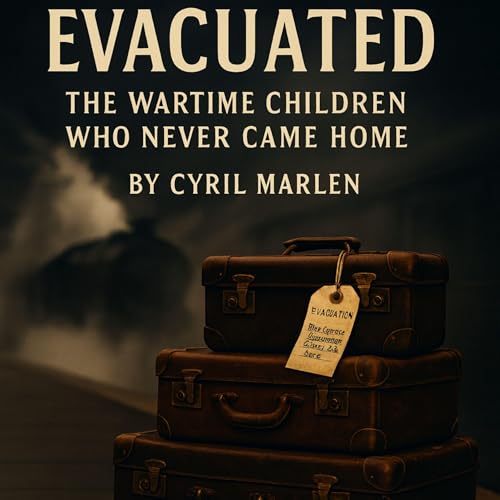
Evacuated
The Wartime Children Who Never Came Home
Échec de l'ajout au panier.
Échec de l'ajout à la liste d'envies.
Échec de la suppression de la liste d’envies.
Échec du suivi du balado
Ne plus suivre le balado a échoué
0,99 $/mois pendant vos 3 premiers mois
Acheter pour 8,71 $
-
Narrateur(s):
-
Jane Charles
-
Auteur(s):
-
Cyril Marlen
À propos de cet audio
War is often remembered through the lens of soldiers, battles, and political leaders, but one of its most enduring human stories belongs to those too young to fight—the children. At the outbreak of the Second World War, governments across Europe launched vast evacuation programmes designed to protect their youngest citizens from the horrors of modern warfare. Operation Pied Piper in Britain alone uprooted nearly 1.5 million people in just a few days, most of them children carrying gas masks and small suitcases, their names tied to their coats like parcels. Behind every departure lay a mixture of hope, fear, and heartbreak.
Evacuated: The Wartime Children Who Never Came Home tells the story of those whose journeys ended in permanent separation, tragedy, or transformation. It is both a history and a memorial, shining a light on young lives disrupted or lost in the struggle to survive a global conflict.
From the railway stations of London to the villages of rural Britain, the evacuation experience was as varied as the children themselves. Some were welcomed with open arms, discovering kindness, open fields, and a different kind of childhood. Others were treated as burdens, left to endure neglect, exploitation, or abuse far from the comfort of their families. Separation from siblings was common, and the sense of abandonment etched scars that lasted long after the war had ended.
This was not only a British story. Across Europe, evacuation was a desperate and recurring reality. German children were sent out of cities under the Kinderlandverschickung programme to escape Allied bombing raids. French and Belgian families fled advancing armies in waves of chaos and panic. Millions of Soviet children were forced eastward into the vast interior as Hitler’s forces invaded. Jewish children were hidden through clandestine networks or sent on the Kindertransport to Britain, escaping death but often never seeing their parents again. The war scattered children across borders and frontiers, making refugees of the most vulnerable.
Tragically, not every child reached safety. Ships carrying evacuees across the Atlantic, such as the ill-fated SS City of Benares, were sunk by U-boats, drowning scores of young passengers. Trains and convoys came under aerial attack. Refugee camps, often overcrowded and unsanitary, bred illness and disease that claimed young lives in silence. For countless families, the promise of safety was shattered in the cruellest of ways.
Even for survivors, “coming home” was not always possible. Some children returned to find their homes destroyed and their parents dead in bombing raids. Others, particularly Jewish children, emerged from hiding only to discover their families had perished in concentration camps. Some remained permanently with foster families, bonded through years of shared experience, while others were adopted, their names, languages, and identities changed forever by the war.
This book explores the urgent need for evacuation, the logistics of moving children by train, ship, and convoy, and the human cost of separation. It looks at the daily realities of foster placements—the kindness, the cruelty, the strangeness of living with strangers. It examines the toll on parents, who endured the agony of separation while carrying the guilt of decisions no parent should ever have to make. It broadens the scope beyond Britain to reveal that this was a pan-European and even global phenomenon, one that bound together millions of stories of loss, resilience, and survival.
©2025 Deep Vision Media t/a Zentara UK (P)2025 Deep Vision Media t/a Zentara UK

